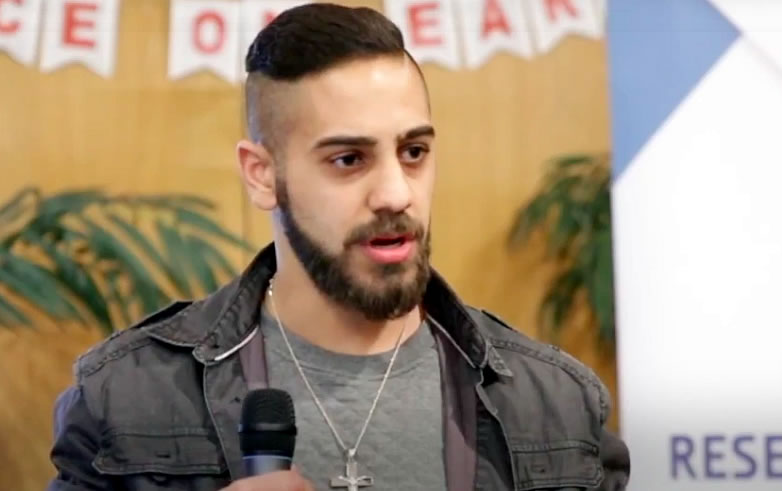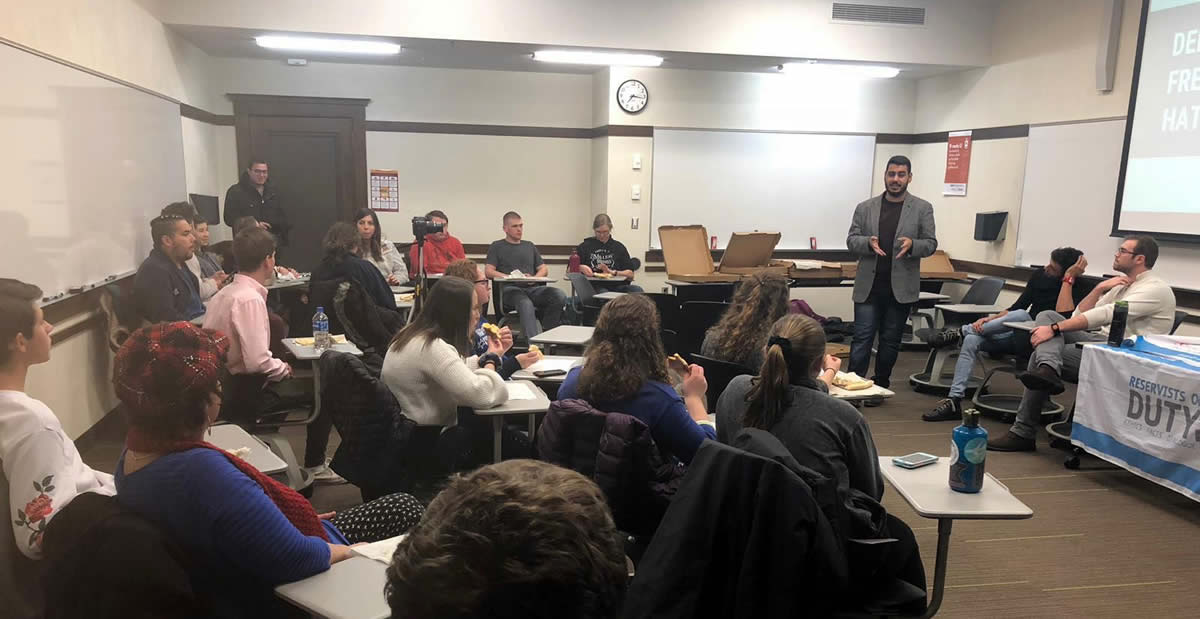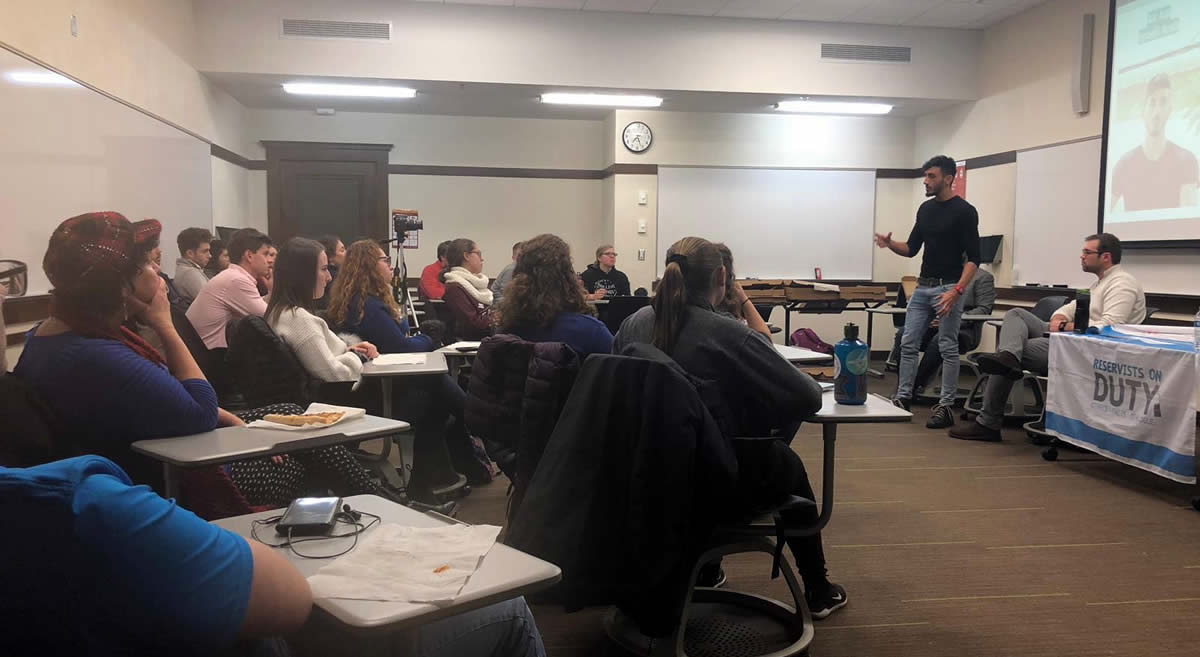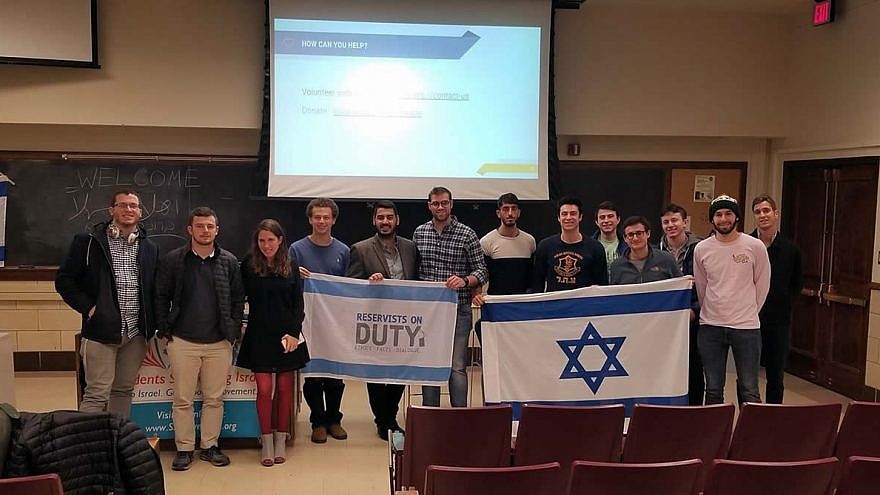campuAs American university campuses continue to be an active battlefront in the fight for Israel, well-trained reinforcements can be useful, even necessary. That’s where Reservists on Duty (RoD) comes in.
Established in 2015 by reserve soldiers in the Israel Defense Forces, the group combats anti-Semitism and anti-Israel activity on college campuses in the United States by deploying reservists living in the United States to counter the anti-Israel narrative from other groups like Students for Justice in Palestine, while providing information and support to pro-Israel campus activists.
“It is a duty for us to fight for Israel—not only at home, but also abroad in the civilian arena—while not being in the army,” said Amit Deri, the group’s CEO.
He told JNS that RoD is distinguishable among campus organizations as its members can effectively communicate the experiences of living in Israeli culture and serving in the military.
Simultaneously, RoD also has an initiative called the Minorities Group, comprised of Arabs, Druze, Muslims, Bedouins, Christians and even some Palestinians. Some of them come in from Israel and some live in America, making it easier to dispatch them to the campuses on moment’s notice. Presentations on campus usually consist of four diverse panelists per event. These minority reserve soldiers also educate students about how to debunk accusations against the Jewish state.

Deri touted the Minorities Group as “the most effective” component of RoD. “The minute we started, we’ve been flooded [with] requests from all over the country to invite them to speak,” said Deri. “When Israeli Jews speak on campus, it’s one thing, but when an Arab citizen of Israel [comes] to speak positively about the State of Israel, the Jewish state of Israel … it’s another thing.”
Speaking to the success of the initiative, Deri explained that “on college campuses and communities, we cannot meet the demand. We don’t have enough resources” to cover all the invitations. “We don’t have enough manpower to do that.”
He noted that an Arab-Israeli invited to speak on campus is “more powerful and more authentic for people to hear what he thinks of Israel.” Sending them allows students and others to gain an alternative perspective about the Jewish state and the overall Mideast. This helps them to refute false narratives about the IDF.
“Not only that, it gives a platform for minorities to share and tell about their lives and also gives a different prospective then the ‘usual’ pro-Israeli prospective,” Jonathan Elkhoury, the coordinator for the Minorities Group, told JNS. “Being on campuses in the States is really important for us because these are the future of the free world, and they have been given a lot of false information about the State of Israel, especially when it comes to minorities.”
Elkhoury said his group has visited almost 70 campuses in the United States over the past year.
He also mentioned that the initiative also combines non-Jewish Israelis who contributed national service, instead of serving in the military.

“I did national service for two years in a hospital in Haifa,” Elkhoury said before speaking about his colleagues. “Nizar Jarayse served in the military, Lorena Khateeb did national service, Raya Othman did national service, Youseph Haddad did military service.”
“Everyone can find a place at Reservists on Duty because what combines us together is us being Israelis who want to defend their country’s name and protect it, as it does for them,” he said.
‘We have faced interruptions, those who tried to shut us down’
In May 2017, 50 members of the SJP chapter at University of California, Irvine, disrupted and yelled an event featuring RoD Jewish, Christian and Muslim panelists (UC Irvine sanctioned SJP later that year).
“UC Irvine was the most powerful hatred that we received from the Students for justice in Palestine. That is when we made the decision to create this group and give it a unique platform,” said Elkhoury. “For me, as an Israeli Christian, it was really shocking to hear so many lies about our life in Israel from students who have never even visited Israel.”
“Being on campuses in the States is really important for us because they have been given a lot of false information about the State of Israel, especially when it comes to minorities.”
“We had to have police escort to go out of campus, and we faced calls to go back to the gas chambers and Europe,” he continued. “We have faced interruptions and those who tried to shut us down on many campuses. Yet we had amazing events along our journey. In particular, [University of California in] Santa Monica and [University of California in] Santa Barbara were really powerful.”
He added that “although it’s not easy, we face disruptions in panels, we sometimes face hatred and calls to hurt us. In the Arabic community in Israel, we will not be silenced from sharing our truth about the democratic and Jewish state: Israel.”
Pro-Israel activists have been impressed with the delegations of soldiers, whose personal experiences often resonate more soundly than the advocacy work of other pro-Israel campus organizations.

Last year, the local chapter of the campus organization Students Supporting Israel hosted Reservists on Duty at the University of Illinois at Urbana-Champaign, which has a sizable enrollment of Jewish students.
“The event was the first Israel event I went to on campus and what really got me involved in Israel advocacy on campus,” Melech Lapson, a junior and president of the SSI chapter at Illinois, told JNS. “There were two speakers, a man and woman who were reservists. They spoke of their experiences as soldiers and the difficult decisions they had to make and live with.”
Although there were no interruptions, SJP members asked questions at the end.
“However, the soldiers were very sharp and respectful, but also firmly answered all their questions,” related Lapson. “They clarified when they were unaware of a certain event and were intellectually honest. There were several memorable moments where there would be a tirade of questions/accusations thrown at the soldiers, and they would snap back with a quick response based on their personal experiences, leaving the questioners stunned.”


























